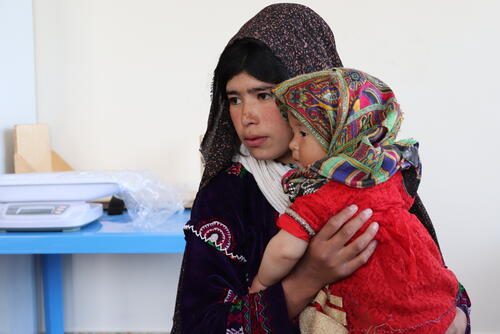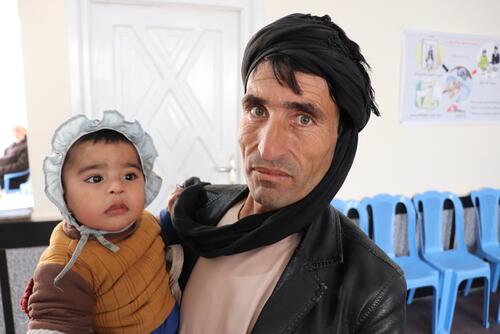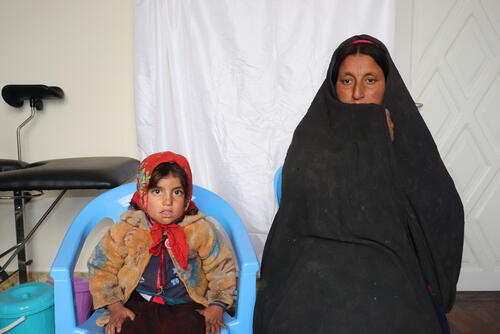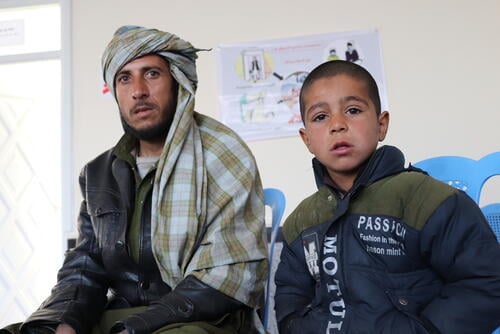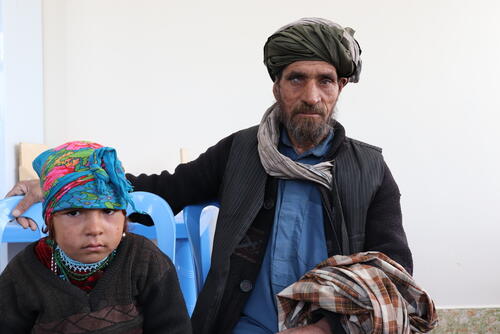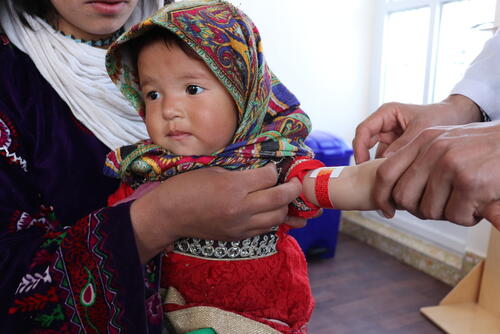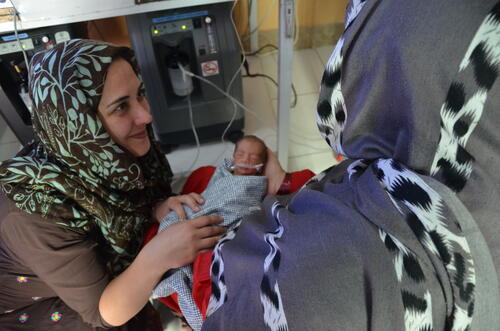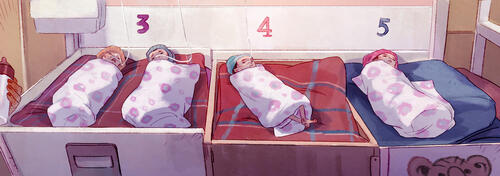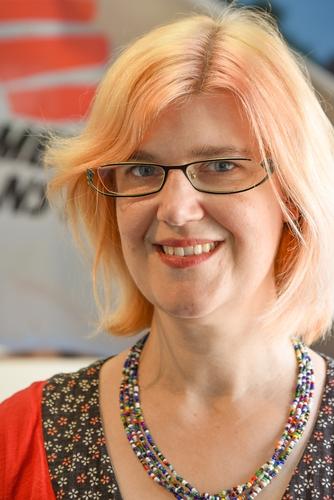Widespread conflict and severe drought has forced over 150,000 people to flee villages in northwestern Afghanistan and seek shelter in the city of Herat. Their condition remains extremely fragile, as they face shortages of food and limited access to healthcare. Médecins Sans Frontières (MSF) opened a winter clinic in Herat to provide much-needed assistance to these vulnerable people.
Little Bibi Hawa is four years old. She has been suffering from pneumonia and fever for four days. Her father, Agha Muhammad, is very worried.
“I brought my daughter here to find treatment for her” he says, his voice subdued, as he sits near the child in the waiting room of our winter clinic for displaced people in Herat. Coping with Afghanistan’s harsh wintry weather is no easy task. “We live in a tent with very cold temperatures outside. We don’t have enough blankets. Our children get sick every other day.”
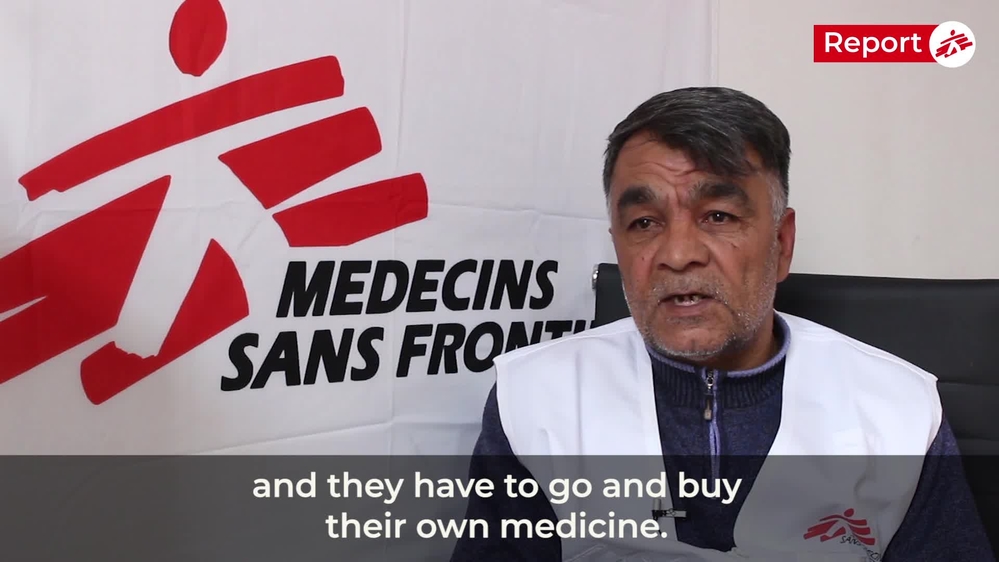
MSF Winter Clinic for IDPs in Herat, Aghanistan
Displaced by drought and violence
Agha Muhammad is 60 years old, and used to live with his family in Naqchiristan, a small village in the rugged, wind-swept Badghis province, one of the poorest areas of northwestern Afghanistan. His family is one of almost 30,000 households, or 150,000 people, who were forced to leave the rural areas where they used to live because of long-lasting drought, compounded by widespread insecurity.
Much of Afghanistan remains a country at war and fighting is rampant between government forces and armed groups in the region. Any respite in combat is usually only due to heavy snowfall.
“Part of my family is still in our village and I’m concerned about how they will cope,” Agha says. “There is no water, we lost our cattle and there is no work for us to feed our children.”
Most of these displaced families settled in Herat province. However, local stakeholders have proved reluctant to accept the presence of organised camps, forcing newcomers to improvise makeshift settlements and rely on humanitarian aid.
We live in a tent with very cold temperatures outside. We don’t have enough blankets. Our children get sick every other day.Agha Muhammad
MSF responds amidst poor living conditions
Living conditions are grossly inadequate and particularly poor when it comes to shelter, water and sanitation. Limited availability of food is another issue, with visible consequences on the health of children and on pregnant or lactating women, who need good quality nutrients to feed their babies.
To provide medical assistance to these vulnerable groups, we set up a clinic in the outskirts of Herat, offering free medical consultations, screening and treatment of malnutrition and vaccination for children through the coldest time of the year.
“We opened the clinic to offer medical care during the rough winter months,” explains Abdul Azim Toryalai, Assistant to the Project Medical Referent. “We also run an ambulance service for patients who need to be taken to hospital.”
Jamala is 40 years old, has five children and is expecting her sixth. Her family is originally from the village of Dara-e-Bam, in Badghis province. She came to the MSF clinic to seek antenatal care: consultations during a woman’s pregnancy are routine activity in much of the world, but a lack of options and limited awareness mean they are not to be taken for granted in this region.
“We had no choice but to leave our village, because our only source of income was our land and drought has badly affected our area. We don’t know how long it will last,” says Jamala. “But since we moved to Herat in August last year, my husband has been unable to find a job and we have no income. I am not sure where and how I will deliver my baby.”
MSF helps fill gaps in area with limited healthcare options
The displaced population in Herat has no money to buy drugs or pay for transportation. This further reduces their options for healthcare, already shrunk by the lack of medical personnel in the area.
MSF doctors and nurses from the Herat clinic provide an average of 100 consultations per day to pregnant and lactating women and children under five, while vaccinating roughly 100 people each week.
We also provide ambulance transportation and refer approximately 25 severe cases to local health structures, including obstetric patients. A majority of people suffer from illnesses associated with either cold weather or insufficient food intake.
We had no choice but to leave our village, because our only source of income was our land and drought has badly affected our area.Jamala, 40 year-old mother of five
Struggles left behind, only to find new struggles
Baloch Khan looks older and more mature than his 30 years of age. His story resembles that of many other patients at our clinic: he left Badghis for Herat in June 2018 and now lives with his family in a tent in an informal settlement.
His four-and-a-half-year-old son Asadullah has had a fever for a few days and cannot sleep at night.
“I used to be a farmer, but over the last two years, insecurity and lack of water made our life miserable,” Baloch says. “Agriculture and husbandry, the only sources of our income, became impossible.”
He managed to leave Badghis’s struggles behind, only to find new ones in Herat.
“My brothers and other relatives are still in Badghis and I have no idea on how much they are suffering there,” he says. “But our life here is also very difficult. Most importantly, we don’t know our fate and what will happen next. My children are growing up in a difficult situation, without school and any education.”
Reliant on aid, with more people to arrive
Though there is a public hospital in the city of Herat, it is located more than 10 kilometres from the settlements and treatment is not completely free. This makes it hardly accessible for the displaced population. Many are eager to add that even if they manage to find the money for transportation to the hospital and for a consultation, they will walk out with a prescription for expensive drugs they will never be able to buy.
“We just rely on aid we receive from humanitarian organisations,” says 20 year-old Khadija, whose two year-old daughter Bibi Aysha is being seen for severe diarrhoea. “I am worried. My daughter has been constantly losing weight since we moved here.”
Another 100,000 displaced people still remain in Badghis province and may soon head for the Herat settlements too, unless the situation changes in those rural areas.



